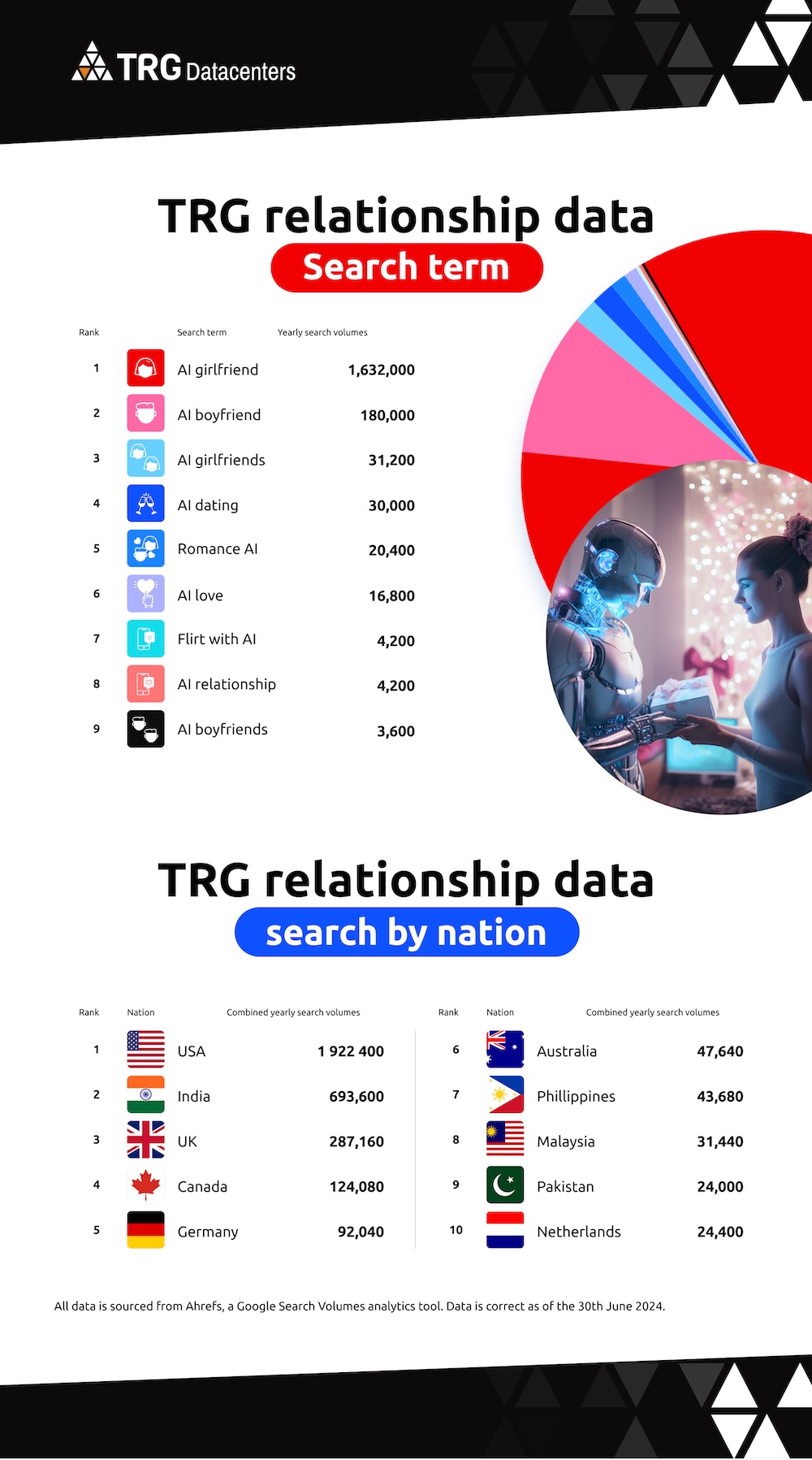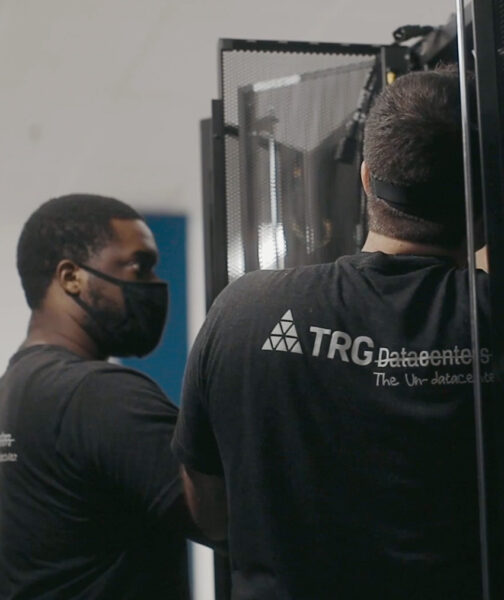It’s been described as “Her” in real life. The Spike Jonze-directed science fiction film follows the lead character as he embarks on a relationship with an operating system. Now, 11 years after the film’s release, that very reality is here. AI relationship chatbots have swept into the world’s eye at great speed, offering as little as some off-the-cuff dating advice, all the way up to a full emulation of a relationship with your perfect partner.
The introduction of AI relationship chatbots has divided the mediasphere, with some stating it saved them from a dysfunctional relationship, while others have critiqued the services for it’s often inaccurate or non-relevant responses.
Like them or not, AI relationship chatbots are here for the long run. So, with that in mind, we decided to investigate which search terms regarding AI relationships people query the most. We also ranked the same data by nation, and below are the results:

Top 5 AI Relationship Search Terms
Below are the search terms relevant to AI relationship chatbots, ranked by quantity.
| Search term | Yearly search results | |
|---|---|---|
| #1 | AI Girlfriend | 1,632,000 |
| #2 | AI Boyfriend | 180,000 |
| #3 | AI Girlfriends | 31,200 |
| #4 | AI Dating | 30,000 |
| #5 | Romance AI | 20,400 |
| #6 | AI Love | 16,800 |
| =#7 | AI Relationship | 4,200 |
| =#7 | Flirt with AI | 4,200 |
| #9 | AI Boyfriends | 3,600 |
By far, the leading search phrase is ‘AI Girlfriend’. Per year, there are over 1.6 million English-language searches seeking AI chatbot girlfriends, a huge quantity. Fascinatingly, Google search results data shows that there were only 100 searches per month for ‘AI girlfriend’ in 2021, highlighting the phrase’s meteoric rise to fame in the zeitgeist.
In second place is the search term “AI Boyfriend”. This phrase yields a far lower search count, seeing just 180,000 queries made per year. While it’s still a high figure, it’s just 11% of that achieved by “AI Girlfriend”.
The gender-neutral terms of “AI Dating” and “Romance AI” come in fourth and fifth respectively, with the former seeing yearly search results of 30,000 and the latter 20,400. This shows that searchers are specifically seeking certain gender emulators to engage with, instead of generic bots.
As seen in the above data, the gender divide in search terms is huge. AI chatbots with a ‘female’ voice, offering the ‘girlfriend experience’, account for 1,663,200 search results per year. The comparative ‘male’ voice sees just 183,600.
The Top 5 Nations Driving the AI Relationships Boom
Below are the leading nations for AI relationship chatbot queries, ranked according to volume
| Nation | Yearly search results per nation | |
|---|---|---|
| #1 | USA | 693,600 |
| #2 | India | 287,160 |
| #3 | UK | 124,080 |
| #4 | Canada | 92,040 |
| #5 | Germany | 47,640 |
| #6 | Australia | 43,680 |
| #7 | Phillippines | 31,440 |
| #8 | Malaysia | 24,000 |
| #9 | Pakistan | 23,400 |
| #10 | Netherlands | 21,720 |
Of the top 10 leading nations by AI relationship searches, the USA comes in first place. With a gargantuan 693,600 yearly cumulative searches, America is the trailblazer for using AI to mimic human relationships. Now, this should come as little surprise to residents of the US, as a 2018 study revealed that just under 50% of Americans feel some level of loneliness in their personal lives. Artificial intelligence cannot yet fully fill in for human contact, but it may go some ways towards eliminating the feeling of isolation 1 in 2 Americans are experiencing.
In second place is the world’s most populous nation: India. With searches for AI relationship chatbots exceeding 285,000 for the first time in the nation’s history (according to Google searches), there’s an emerging appetite for AI intimacy in India. Third place, with under half of India’s search quantity, is the UK at 124,080, closely followed by Canada at 92,040, and Germany with 47,640.
According to Ahrefs, a Google Search analysis tool, AI relationship chatbot searches are expected to double by 2026, highlighting the rapid trajectory of growth AI chatbots are on. OpenAI, the team behind ChatGPT, are currently in the research and beta testing phase of ChatGPT 4.0, which promises more human-like interactions. Success in the human interaction field could help AI relationship chatbots become more intelligent and empathetic, thus attracting more users.
When talking to an AI chatbot of any kind, it’s important to recognise that data security is extremely important. Not every AI service is fully transparent, and so it’s worth bearing these three tips in mind:
1. Keep your personal details private
The future of AI is the software embedded into technology we already have. Organisations make money through targeted marketing, which is successful because it scrapes data from a litany of sources, ranging from search history to Voice Assistant analysis. The more accurate personal information you share with AI, the more you become a target for data-driven marketing techniques. Retain your privacy by being vague with AI chatbot services.
2. Read the terms and conditions of each AI service you use
Whilst this bullet point is relevant to the majority of social medias and softwares we use, it’s of vital importance now. AI software isn’t governed like traditional technology, and so by reading the terms of each chatbot, you can keep yourself secure. Your data could be sold, intercepted, or stolen by hackers. Keep your eyes open to just how many data points AI wants to access.
3. Remember no AI chatbot is perfect, so don’t take all advice onboard
It’s a popular belief that AI chatbots want to help you more than anything else, and yet so often does their advice fall flat. Notable examples include Air Canada’s chatbot giving out incorrect information to passengers, an eating disorder AI chatbot giving out dieting tips, and a US-based tax advice company’s chatbot making people file their returns incorrectly. Not every piece of advice given by an AI chatbot is worth listening to, so think critically before utilising any of the dating tips in real life.
A final word, courtesy of the AI relationship chatbot at Flamme AI:
Ultimately, AI relationship chatbots are not meant to replace human connection, but rather to complement and enhance it. They can provide a valuable resource for those seeking guidance and support in their relationships, offering a unique combination of convenience, affordability, and personalized advice.
Methodology
- TRG Datacenters sought to research public attitudes towards relationship chatbots powered by generative AI
- To do this, TRG Datacenters curated a seed list of relevant search phrases, such as “ai girlfriend” and “romance AI”. They utilised 9 key phrases, of which full data is available at the link above.
- Once a seed list had been curated, data from each country yielding results was scraped from Ahrefs, a Google Search tool. Both the quantity and location of searches was recorded and analysed for each search phrase. Search results come in ‘per month’ format. TRG Datacenters multiplied all results by 12, indicating an average yearly result for each phrase.
- Once the full data was calculated, all results were ranked from largest to smallest.
- Data is correct as of the 18th of June 2024 (inclusive).







